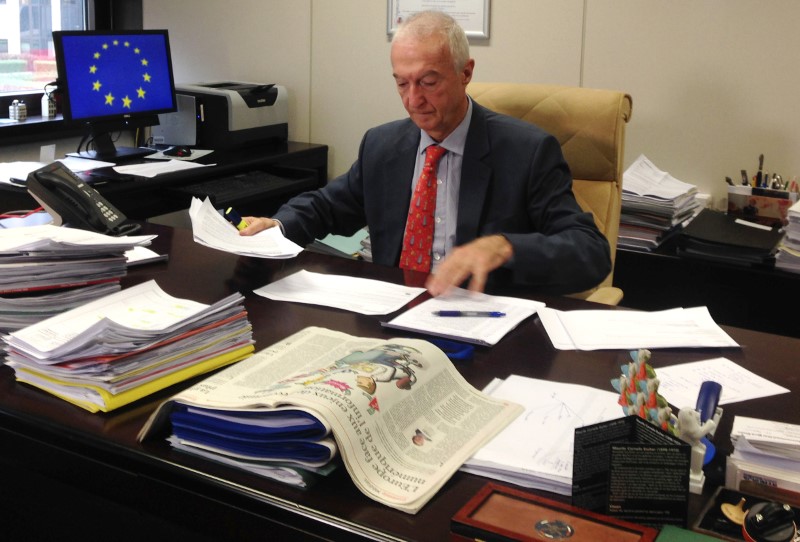
European Union’s Counter-Terrorism Coordinator Gilles de Kerchove is seen during an interview with Reuters in his office in Brussels, Belgium December 2, 2016. REUTERS/Alastair Macdonald
November 30, 2017
By Tulay Karadeniz and Tuvan Gumrukcu
ANKARA (Reuters) – The European Union does not share Turkey’s view that the network of U.S.-based Muslim cleric Fethullah Gulen is a terrorist organization and would need to see “substantive” evidence to change its stance, the EU’s counter-terrorism coordinator said.
The comments by Gilles de Kerchove are likely to infuriate Ankara, which accuses Gulen of masterminding a failed military coup last year, in which more than 250 people were killed. Gulen has denied the charge and condemned the coup.
Turkey has long accused its NATO allies, including the United States and Germany, of failing to condemn the abortive putsch strongly enough, saying they appeared more concerned by Ankara’s ensuing crackdown on suspected supporters of the coup.
“As for FETO, we don’t see it as a terrorist organization, and I don’t believe the EU is likely to change its position soon,” Kerchove said, using the Turkish government’s acronym for Gulen’s network.
“You need not only circumstantial evidence – like just downloading an app – but concrete substantive data which shows that they were involved…,” he told Reuters in an interview cleared for publication on Thursday.
Turkish authorities have detained some 50,000 people, including teachers, police officers, journalists and U.S. consular staff for alleged links to Gulen’s network. Some 150,000 people have been sacked or suspended from their jobs.
Some have been detained for having downloaded ByLock, a messaging app the government says was used by the coup plotters.
Others have been detained for having had telephone calls with ByLock users.
EXTRADITION SOUGHT
Human rights groups and some EU officials accuse Erdogan of using the crackdown to muzzle dissent in Turkey, a charge Ankara denies. It says the scale of the clampdown is justified because the Gulen network threatens national security.
Gulen was once an ally of Erdogan and his Islamist-rooted AK Party and his movement ran schools, banks and media outlets in Turkey until the two men had a public falling-out in 2013.
Germany’s BND spy agency has said it is not convinced that Gulen was behind the failed coup, in which rogue soldiers used tanks and helicopters to attack Turkey’s parliament and other key targets.
Turkey has also sought, so far unsuccessfully, Gulen’s extradition from the United States, where the cleric has lived in self-imposed exile since 1999.
U.S. officials say their courts require sufficient evidence to order his extradition.
As of July, Turkey had supplied 84 boxes of documents to the United States for evidence, Ankara’s envoy to Washington has said, although he has acknowledged that more concrete evidence of Gulen’s direct involvement has remained elusive.
Germany, which has sharply criticized the mass arrests in Turkey, has refused to extradite people Ankara says were involved in the plot or linked to Gulen’s network.
“The decision on extradition is in the hands of all member states, and most of the time the judiciary, the independent judiciary, and they need hard evidence,” Kerchove said.
(Reporting by Tulay Karadeniz and Tuvan Gumrukcu; Editing by David Dolan and Gareth Jones)
